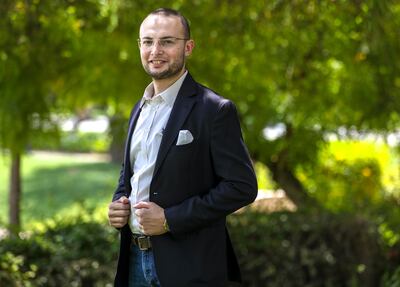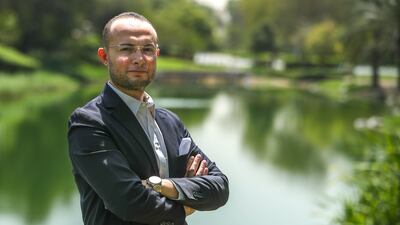Hussein Hosni launched wholesale smart grocery marketplace Grocart with his wife, Nesma Zaghow, to connect retailers with fast-moving consumer goods suppliers in the UAE.
The Egyptian began his career in sales at an international healthcare company and moved to Saudi Arabia as a product manager before relocating to Dubai six years ago.
Mr Hosni applied his background in sales, logistics and marketing to co-found Grocart in 2020, helping small grocery stores to survive during Covid-19 restrictions.
The business-to-business wholesale food and grocery platform fills a supply chain gap between retailers, manufacturers and distributors, accessing 20,000-plus products via same-day delivery.
Mr Hosni, 39, his wife, and daughters aged 10 and seven, live in Dubai Sports City.
Where did money fit into your childhood?
My father was an engineer, my mother a librarian. We grew up in Cairo in a safe environment, not a big house, a family of six people.
We were not rich, money was not easy. However, all our needs were fulfilled and we were logical in our needs, no expensive brands.
Did that influence you?
My mother advised, “Always buy not to sell” and “Saving saves you in hard times”. She was pushing me more towards saving, and then always to try to buy, but not to sell [off] what I buy.
I took this advice and applied it in my life. For example, if I bought an apartment today, I’d try not to sell it. If I save money, I try not to spend it.
How did you first earn?
At university during holidays, I engaged in training and internships in pharmacies and pharmaceutical companies — for free, but I learnt and listened to my mentors.
Then I started working as a pharmacist in Egypt’s biggest chain. My first salary was 2,500 Egyptian pounds (Dh500). I moved to Novartis, then to Saudi Arabia, where I stayed almost nine years.
I was planning to come to the UAE. I had a passion to have my own business, but in Saudi Arabia at that time it was difficult to own a company 100 per cent.
You sought self-employment over career growth?
Since childhood, I had two main personal values. The first was about success, which I achieved in my traditional career, the second about financial stability.
I didn’t find this in such companies [employers], because at some critical points they tend to downsize.
It is not good to be under such stress, so I found the safest and most comfortable route to financial stability is to own a business.
Sometimes, if you don’t go out of your comfort zone on your own, you will be forced out of it, so it’s better to choose the timing.
Why Grocart?
We worked on the concept for six months and got the licence one month before [the pandemic lockdown].
Once Covid came, we noticed a big space for us to flourish, especially when we saw empty shelves inside grocery stores and supermarkets.
Supply chains had been affected and we could offer a solution for minimarts and supermarkets by offering wide variety with a few clicks, at reasonable prices.

How did you fund it?
From my pocket for the first few months, then we got investment from Instashop. Once we found we were on the right track, I decided to move [from my job] after almost one year.
I found time to start my business during the pandemic because we stayed home. It was good timing.
We started from zero and now cover all of Dubai. We have reached a level we can scale all over the country and expand to other countries.
How does it financially benefit clients?
Suppliers … we offer wider variety, less risk in the money collection, improve logistics and decrease their operational costs.
For retailers, we increase profit, variety, faster delivery, so their shelves are never out of stock. Secondly, it’s about automation and digitalisation, which offer value for the retailer in all verticals.
It was not easy securing the first order. We started with only a few shops and now have more than 1,000 and chain supermarkets ordering from us.
When your purchasing power increases, you can offer competitive prices.
Do you still manage to save?
I am more saver than spender. Saving is important for me, followed by investing and donating.
In Saudi Arabia, I was saving almost 60 per cent [of earnings], especially when I was single. I’m still saving, but it’s almost 20 per cent.
founder, Grocart
I diversify, have savings accounts, gold (ETFs and physical) and am new into stocks. I own apartments in Egypt. You can get a lot of return on investment there.
Any philosophy on money?
Money should be in your hand, not in your heart … in your hand to use it, invest it, to donate. In your heart, you will never want to spend it and just save, save, save.
You need to invest and when you donate or give sadaqa (voluntary) or zakat (mandatory for Muslims), you will be happier, you will get more money. It has a marvellous impact when you give joy and happiness for others.
So money can buy happiness?
Money has a role, to make you happy and to live a respectful life, to have a good house and education. Money is important.
It is not the only reason for happiness, it’s a component. But if money is the only reason for you to be happy, once you spend it you will become sad.
If you continue wasting money, it will not add any pleasure. You need to be satisfied with what you have. I am, and keep growing until I achieve my goals. You need a balance.
Has your outlook evolved?
When I was young, I expected that getting money would be hard. As I grew, I found getting money is not hard, but getting the right idea is.
You need to think how to invest and find the right business, then money will come easier.
If you take notice of what is happening around you, you can find a lot of opportunities to focus on and offer value.
But don’t fall in love with your idea. You are not a tree — move, change, improve, don’t be stagnant. If you feel your idea is the best idea in the world, you will fail.
Any spending regrets?
I never regret spending, only making a fast decision about spending. It’s not about the money spent; I need to think before spending.
Even if I buy ice cream, which flavour I like, I make a proper decision. I love taking time to think, then take action.
What are you happiest paying for?
Going out, travelling with and spending time with my family and bringing happiness to my daughters.
Also, here in Dubai, I like to take a boat and go fishing in the middle of the sea.
What is your future direction?
My goal is to have successful businesses and to give encouragement, motive and empowerment to others to start businesses and be successful. This is my passion.
It is not an easy mission and there is no ideal time to start … if you wait for circumstances to be ideal, it will never come.
I’m not thinking about retirement, because when you do what you enjoy, you enjoy your life, you don’t need a retirement plan.

